#provisional irish republican army
Text
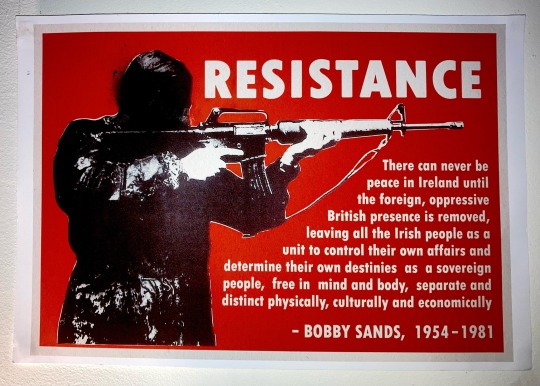
#mine#outlaws and partisans#Irish Republican Army#provisional irish republican army#provisional IRA#PIRA#IRA#guerilla#national liberation#Bobby Sands#H Block#anti imperialism
256 notes
·
View notes
Text
#OTD in 1976 – Tens of thousands defied a ban on commemorating the heroes of Easter 1916 at the GPO in Dublin.
In 1976, the 60th anniversary of the Rising, the southern state and the republican paramilitaries – particularly the Provisional IRA were in frank confrontation.
The Irish government banned that year’s proposed Easter parade by republicans under the Offences Against the State Act – its anti-terrorist legislation. Just ten years after the state’s own bombastic commemoration of the Rising in 1966,…

View On WordPress
#1916 Easter Rising#60th Anniversary#Dublin#GPO#History#History of Ireland#Ireland#Irish History#O&039;Connell Street#Offences Against the State Act#Provisional Irish Republican Army#Stephen’s Green#The Irish Times
11 notes
·
View notes
Text
0 notes
Text
1 note
·
View note
Text
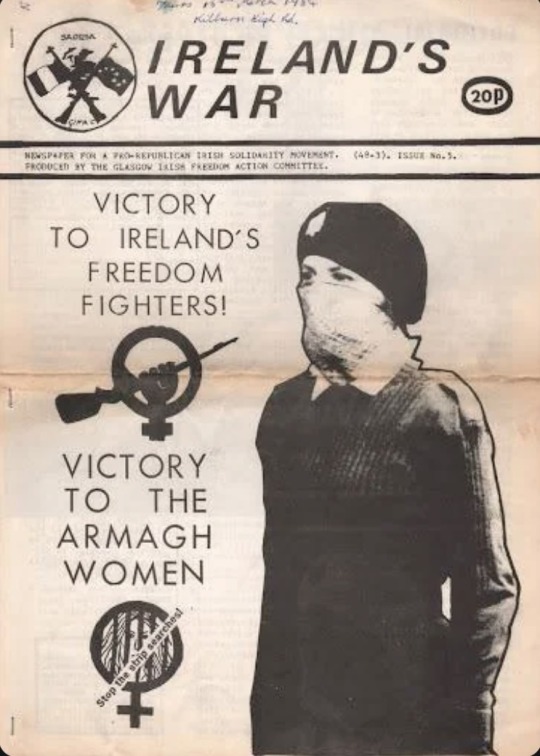
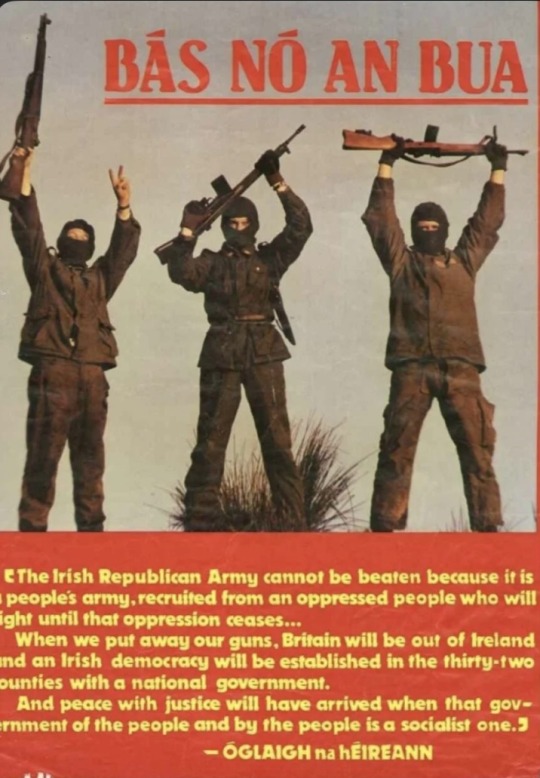

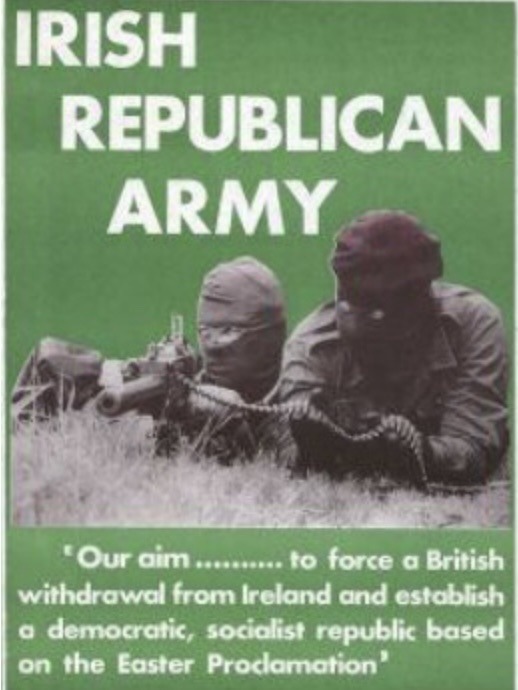


IRA posters
#ira#irish Republican army#pira#provisional ira#ireland#irish#northern ireland#irish history#northern irish history#irish catholic#propaganda#own post
414 notes
·
View notes
Text
Well done, Agent Truss. You have eliminated the Queen and brought England to its knees. The Provisional Irish Republican Army thanks you for your service. Return to base for further instructions.
9K notes
·
View notes
Text
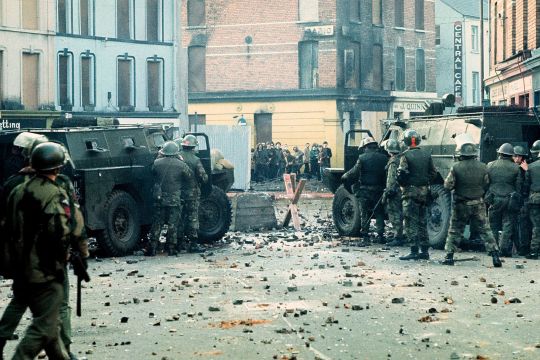
30 January 1972: Bogside Massacre, or the Bloody Sunday
Bogside Massacre, or the Bloody Sunday, was a massacre on 30 January 1972 in the Bogside area of Derry, Northern Ireland, when British soldiers shot 26 civilians during a protest march against internment without trial. Fourteen people died: 13 were killed outright, while the death of another man four months later was attributed to his injuries. Many of the victims were shot while fleeing from the soldiers, and some were shot while trying to help the wounded. Other protesters were injured by shrapnel, rubber bullets, or batons, and two were run down by army vehicles. All of those shot were Catholics. The march had been organised by the Northern Ireland Civil Rights Association (NICRA). The soldiers were from the 1st Battalion, Parachute Regiment (“1 Para”), the same regiment implicated in the Ballymurphy massacre several months prior.
Two investigations were held by the British government. The Widgery Tribunal, held in the immediate aftermath, largely cleared the soldiers and British authorities of blame. It described the soldiers’ shooting as “bordering on the reckless”, but accepted their claims that they shot at gunmen and bomb-throwers. The report was widely criticised as a “whitewash”. The Saville Inquiry, chaired by Lord Saville of Newdigate, was established in 1998 to reinvestigate the incident. Following a 12-year investigation, Saville’s report was made public in 2010 and concluded that the killings were both “unjustified” and “unjustifiable”. It found that all of those shot were unarmed, that none were posing a serious threat, that no bombs were thrown and that soldiers “knowingly put forward false accounts” to justify their firing. The soldiers denied shooting the named victims but also denied shooting anyone by mistake. On publication of the report, the British prime minister David Cameron made a formal apology on behalf of the United Kingdom. Following this, police began a murder investigation into the killings.
Bloody Sunday came to be regarded as one of the most significant events of the Troubles, because many civilians were killed by forces of the state, in full view of the public and the press. It was the highest number of people killed in a single shooting incident during the conflict and is considered the worst mass shooting in Northern Irish history. Bloody Sunday fuelled Catholic and Irish nationalist hostility towards the British Army and worsened the conflict. Support for the Provisional Irish Republican Army (IRA) rose, and there was a surge of recruitment into the organisation, especially locally.
In all, 26 people were shot by the paratroopers; 13 died on the day and another died of his injuries four months later. The dead were killed in four main areas: the rubble barricade across Rossville Street, the courtyard car park of Rossville Flats (on the north side of the flats), the courtyard car park of Glenfada Park, and the forecourt of Rossville Flats (on the south side of the flats).
All of the soldiers responsible insisted that they had shot at, and hit, gunmen or bomb-throwers. No soldier said he missed his target and hit someone else by mistake. The Saville Report concluded that all of those shot were unarmed and that none were posing a serious threat. It also concluded that none of the soldiers fired in response to attacks, or threatened attacks, by gunmen or bomb-throwers. No warnings were given before soldiers opened fire.
The casualties are listed in the order in which they were killed.
John ‘Jackie’ Duddy, age 17. Shot as he ran away from soldiers in the car park of Rossville Flats. The bullet struck him in the shoulder and entered his chest. Three witnesses said they saw a soldier take deliberate aim at the youth as he ran. He was the first fatality on Bloody Sunday. Both Saville and Widgery concluded that Duddy was unarmed.
Michael Kelly, age 17. Shot in the stomach while standing at the rubble barricade on Rossville Street. Both Saville and Widgery concluded that Kelly was unarmed. The Saville Inquiry concluded that 'Soldier F’ shot Kelly.
Hugh Gilmour, age 17. Shot as he ran away from soldiers near the rubble barricade. The bullet went through his left elbow and entered his chest. Widgery acknowledged that a photograph taken seconds after Gilmour was hit corroborated witness reports that he was unarmed. The Saville Inquiry concluded that 'Private U’ shot Gilmour.
William Nash, age 19. Shot in the chest at the rubble barricade. Three people were shot while apparently going to his aid, including his father Alexander Nash.
John Young, age 17. Shot in the face at the rubble barricade, apparently while crouching and going to the aid of William Nash.
Michael McDaid, age 20. Shot in the face at the rubble barricade, apparently while crouching and going to the aid of William Nash.
Kevin McElhinney, age 17. Shot from behind, near the rubble barricade, while attempting to crawl to safety.
James 'Jim’ Wray, age 22. Shot in the back while running away from soldiers in Glenfada Park courtyard. He was then shot again in the back as he lay mortally wounded on the ground. Witnesses, who were not called to the Widgery Tribunal, stated that Wray was calling out that he could not move his legs before he was shot the second time. 'Soldier F’ faces charges for his murder.
William McKinney, age 26. Shot in the back as he attempted to flee through Glenfada Park courtyard. 'Soldier F’ faces charges for his murder.
Gerard 'Gerry’ McKinney, age 35. Shot in the chest at Abbey Park. A soldier, identified as 'Private G’, ran through an alleyway from Glenfada Park and shot him from a few yards away. Witnesses said that when he saw the soldier, McKinney stopped and held up his arms, shouting “Don’t shoot! Don’t shoot!”, before being shot. The bullet apparently went through his body and struck Gerard Donaghy behind him.
Gerard 'Gerry’ Donaghy, age 17. Shot in the stomach at Abbey Park while standing behind Gerard McKinney. Both were apparently struck by the same bullet. Bystanders brought Donaghy to a nearby house. A doctor examined him, and his pockets were searched for identification. Two bystanders then attempted to drive Donaghy to hospital, but the car was stopped at an Army checkpoint. They were ordered to leave the car and a soldier drove the vehicle to a Regimental Aid Post, where an Army medical officer pronounced Donaghy dead. Shortly after, soldiers found four nail bombs in his pockets. The civilians who searched him, the soldier who drove him to the Army post, and the Army medical officer, all said that they did not see any bombs. This led to claims that soldiers planted the bombs on Donaghy to justify the killings.
Patrick Doherty, age 31. Shot from behind while attempting to crawl to safety in the forecourt of Rossville Flats. The Saville Inquiry concluded that he was shot by 'Soldier F’, who came out of Glenfada Park. Doherty was photographed, moments before and after he died, by French journalist Gilles Peress. Despite testimony from 'Soldier F’ that he had shot a man holding a pistol, Widgery acknowledged that the photographs show Doherty was unarmed, and that forensic tests on his hands for gunshot residue proved negative.
Bernard 'Barney’ McGuigan, age 41. Shot in the back of the head when he walked out from cover to help Patrick Doherty. He had been waving a white handkerchief to indicate his peaceful intentions. The Saville Inquiry concluded that he was shot by 'Soldier F’.
John Johnston, age 59. Shot in the leg and left shoulder on William Street 15 minutes before the rest of the shooting started. Johnston was not on the march, but on his way to visit a friend in Glenfada Park. He died on 16 June 1972; his death has been attributed to the injuries he received on the day. He was the only fatality not to die immediately or soon after being shot.
Paul McCartney (who is of Irish descent) recorded the first song in response only two days after the incident. The single, entitled “Give Ireland Back to the Irish”, expressed his views on the matter. This song was one of few McCartney released with Wings to be banned by the BBC.
The 1972 John Lennon album Some Time in New York City features a song entitled “Sunday Bloody Sunday”, inspired by the incident, as well as the song “The Luck of the Irish”, which dealt more with the Irish conflict in general. Lennon, who was of Irish descent, also spoke at a protest in New York in support of the victims and families of Bloody Sunday.
Irish poet Thomas Kinsella’s 1972 poem Butcher’s Dozen is a satirical and angry response to the Widgery Tribunal and the events of Bloody Sunday.
Black Sabbath’s Geezer Butler (also of Irish descent) wrote the lyrics to the Black Sabbath song “Sabbath Bloody Sabbath” on the album of the same name in 1973. Butler stated, “…the Sunday Bloody Sunday thing had just happened in Ireland, when the British troops opened fire on the Irish demonstrators… So I came up with the title 'Sabbath Bloody Sabbath’, and sort of put it in how the band was feeling at the time, getting away from management, mixed with the state Ireland was in.”
The Roy Harper song “All Ireland” from the album Lifemask, written in the days following the incident, is critical of the military but takes a long-term view with regard to a solution. In Harper’s book (The Passions of Great Fortune), his comment on the song ends “…there must always be some hope that the children of 'Bloody Sunday’, on both sides, can grow into some wisdom”.
Brian Friel’s 1973 play The Freedom of the City deals with the incident from the viewpoint of three civilians.
Irish poet Seamus Heaney’s Casualty (published in Field Work, 1981) criticizes Britain for the death of his friend.
The Irish rock band U2 commemorated the incident in their 1983 protest song “Sunday Bloody Sunday”.
Christy Moore’s song “Minds Locked Shut” on the album Graffiti Tongue is all about the events of the day, and names the dead civilians.
The events of the day have been dramatised in two 2002 television films, Bloody Sunday (starring James Nesbitt) and Sunday by Jimmy McGovern.
The Celtic metal band Cruachan addressed the incident in a song “Bloody Sunday” from their 2004 album Folk-Lore.
Willie Doherty, a Derry-born artist, has amassed a large body of work which addresses the troubles in Northern Ireland. “30 January 1972” deals specifically with the events of Bloody Sunday.
In mid-2005, the play Bloody Sunday: Scenes from the Saville Inquiry, a dramatisation based on the Saville Inquiry, opened in London, and subsequently travelled to Derry and Dublin. The writer, journalist Richard Norton-Taylor, distilled four years of evidence into two hours of stage performance at the Tricycle Theatre. The play received glowing reviews in all the British broadsheets, including The Times: “The Tricycle’s latest recreation of a major inquiry is its most devastating”; The Daily Telegraph: “I can’t praise this enthralling production too highly… exceptionally gripping courtroom drama”; and The Independent: “A necessary triumph”.
In October 2010, T with the Maggies released the song “Domhnach na Fola” (Irish for “Bloody Sunday”), written by Mairéad Ní Mhaonaigh and Tríona Ní Dhomhnaill on their debut album.
Read more about the Bogside Massacre
Daily inspiration. Discover more photos at Just for Books…?
24 notes
·
View notes
Text

Provisional Irish Republican Army (PIRA)
101 notes
·
View notes
Text
Loves Revolution
Chapter 1
Pairing: Bradley Bradshaw (as Micheal Collins) x Jake Seresin (as Harry Boland) x OC! Madison Cassidy
Word count: 3.2K
A/n: This is the first post to my new series so please be nice! I'm going to try to make this into a series so please show this story a bit of love and reblog!
Summary: Bradley, Jake and Maddie have been friends for many years ongoing. Bradley from Cork and Jake and Madison from the troubled Dublin, have been close for life. Now fighting in the 1916 Easter rising and the ongoing history to the Treaty and the independence of Ireland their story lives on...
History: Bradley (represents) :Michael Collins (October 16, 1890 – August 22, 1922) was an Irish revolutionary, soldier, and politician who was a key role in the early twentieth-century campaign for Irish independence. During the Irish Civil War, he served as Director of Intelligence for the Irish Republican Army (IRA) and as a government minister in the self-proclaimed Irish Republic. From January 1922, he was Chairman of the Provisional Government of the Irish Free State, and from July till his death in an ambush in August 1922, he was Commander-in-Chief of the National Army.
Jake (represents) :Harry Boland (April 27, 1887 – August 1, 1922) was an Irish republican politician who led the Irish Republican Brotherhood from 1919 to 1920. From 1918 until 1922, he was a Teachta Dála (TD).He was elected as the MP for Roscommon South in the 1918 general election, but, like other Sinn Féin candidates, he did not serve in the British House of Commons, instead sitting as a TD in the First Dáil. Boland was elected to the second Dáil as a TD for Mayo South-Roscommon South in the 1921 general election. He was re-elected as an anti-Treaty candidate in 1922, but he perished two months later during the Irish Civil War.
History :The Easter Rising (Irish: Éir Amach na Cásca), often known as the Easter Rebellion, was an armed insurgency in Ireland in April 1916 during Easter Week. While the United Kingdom was waging the First World War, Irish republicans started the Rising against British control in Ireland with the goal of establishing an independent Irish Republic. It was Ireland's greatest important insurrection since the 1798 rebellion and the first armed battle of the Irish revolutionary period. Beginning in May 1916, sixteen of the Rising's leaders were executed. The executions' nature, as well as following political developments, eventually contributed to an upsurge in popular support for Irish independence.
Warning: Mentions of gun use, ptsd, mentions of death, mentions of shooting, flirting, mentions of abuse, description of dead body, death, blood
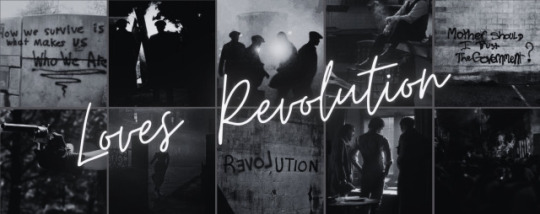
Year 1916, Easter
"Sir, we got the General Post Office surrounded, Sir! We believe that inside are De Valera, Macdonagh, Clark, Connolly and a lot of other rebellions, sir!" One of the funny dressed British soldiers replies to their head commander, with hand at forehead, ready for a salute. This is how the English planned it all along, for the most important rebellions to be stuck at one place, surrounded with no escape.
"So we have the G.P.O, good, very good, but what about O'Connells street, Stevens green, The Liffey and the four courts?" The head commander asked the young man who still held his hand above his head, not moving an inch. "The areas are empty, sir! Either captured or escaped but the rest are at the G.P.O, sir!"
They're all where they were supposed to be, all in one place, no room to escape and they'll give in to this nonsense, they had no way to continue fighting against the British or loyal Irish. The undertakers or loyal Irish were against the rebellions, fighting against them at this very moment, all they had to do now is give themselves up to the English.
"Are there any women inside, lieutenant?" Any innocent woman that had been stuck inside the G.P.O that had been inside the building for the past five days, did not deserve the faith they may face in several minutes from now. The soldiers aligned outside of the building will not hesitate to kill anyone on the inside but the women didn't deserve it.
"There's women of aid and very little volunteers, sir! We believe that one of the fellow female friends of De Valera's help is inside the building. Her parents put her off name Madison Cassidy, but to the public she's known as 'Maddie', sir!" A woman so apparently known to the public but how? No woman that the commander has heard of went by that name or was 'known to the public', no woman has ever had the might or power to be so known in the streets of Dublin or the county of Leinster. "What do you mean 'known to the public', lieutenant?" "She's a public speaker, sir!"
A female public speaker? And that was apparently known to people. Absurd. An absolute absurdity. Some young girl, that he has never heard of decided to become a public speaker. What a joke! She should be scrubbing the dishes, washing the linen, taking care of the kids or cooking and not wasting her time over public speeches. And who would even listen to her? Some sort of female, trying to put her thought into a speech that is apparently supposed to motivate people to do something.
And she believes that's gonna work, but like the lieutenant mentioned, she did work with De Valera. "Bring her to me, nobody lay a finger upon her, understood?" "Yes sir!"
---------------
The gun shots echoed in your ears. It was a sensation as if your ears were violently and rapidly ringing, due to the awful noises that have been haunting your brain for the past five days. You've been in the G.P.O for so long and at this point, it felt like you haven't left in centuries.
You're hiding behind a big, destructed pillar at the moment, leaning your back against it, catching your breath. There was no way out, there was English all around the grand building and mostly everything inside was burning and what didn't make it better is the roof, it's too weak to hold more racket. Even if the English didn't manage to get you guys out, the roof looked like it was only gonna last two more days before swallowing all of you.
"Maddie!" Bradley's voice, called out as the rebel has been looking for you. Him and Jake have been shooting from further up front of the building and now you were unsure if to answer. You couldn't fight more, even though it was written in your blood to fight for the right of being an independent country. But now Leinster, Munster, Connaught and Ulster should forgive you but you've had enough.
"I'm here!" You call out from behind the pillar, Bradley immediately runs over to you, diving behind the pillar like you did as a shelter from not getting shot.
"We're giving up," he told you, those baby cow eyes never dropping your gaze, not even for a second. "What?" You couldn't believe it. You guys destroyed Dublin. The streets of your hometown were in ruins from this rebellion, just so you could give up. That was bloody nonsense.
"They got us surrounded, we have no choice but to give in." "Bradle-" He cut you off, he knew you'd argue or do some sort of disagreement but there was no other way. "I know Maddie, but we had a meeting upstairs and there's nothing we can do they have the four courts and Stevens green and the rest. We have to make it out alive and this is not a step towards that."
You look over the pillar to see men on your side fighting, tired wrecked and most likely depressed. They're not going to make it out alive if we don't give up but if we do they'll probably be shot, either way.
"BRADSHAW!" De Valera calls out, with his old, crispy sharp voice. Sounds like a snob but is the chief, the man everyone listens to and who is leading your group forward. He had to go, you wonder how or when they're going to give up but he lays a soft, delicate, quick kiss on your cheek and gets up and runs towards Jake to help. Jake looks like he had enough.
The building's broken architecture, dust has covered his body and he looks wrecked. He looked over at Bradley running and quickly yanked him behind to a standing pillar up front of the G.P.O. The military has brought in machine guns, full loads and everyone crouches down with full might trying not to get shot. You all were going to die, you knew it. Either shot now or shot later is how you're all going to end, just each had to decide what's best for themselves.
For a full ten minutes of nonstop shooting, the military guns stopped, waiting for a reaction out of the rebellion group. They were going to give up now, you knew it. Dev and the rest ran over to a soldier and wrapped a white flag around his shotgun and told him to head up front.
This is the sign of the rebellions giving up. This was the sign to signify that you guys had enough. One by one they leave the building and you get up from behind the fallen pillar and run to the exit. The second you reach behind De Valera, Bradshaw and Seresin you could tell they were going to give up and this was the end for them.
You stand behind them as the English General calls out orders, "FOUR STEPS FORWARD!" You all do as told. "DROP YOUR WEAPONS!" Anyone who held a gun or anything of that sort does as they're told. "NOW, TWO STEPS BACK!" And that was the last order till the round up.
---------------
An English General was calling out English rebellion names, one by one, dragging them out of the crowd by his ugly cane. "McDonagh. Thomas Clark." Both were dragged out of the crowd by the bloody officer. Each name was dragged out in his tongue and then the actionist was dragged out of the group, except one injured man, Connolly, who was lying down due to a leg wound and instead he was just kicked and carried away on the cloth stretcher.
"Get up, you Fenian swine. Now who else am I missing?" The general murmurs are loud enough for you to hear. He looks up and down the crowd and lays his gaze upon you. "Cassidy!" He calls out your second name and dragged you with his cane forward. Beside you stood the rest of your friends just like before and called out one more name before leaving. "De Valera!"
At that Bradley grunted and pulled a bit forward but Jake got a grip of him and pulled him back. "Brad, if we wanna make out of this shit hole alive, I'm sorry to say but we can't do anything about this," Jake says as he watches the officers drag you and Dev away. And murmurs lowly below his breath, "We can't do anything now."
---------------
They dragged you out of your cell. Death by the firing squad, you can see it so clearly now. Your own fellow friends, the 'Loyal Irish' are about to shoot you and cost you your life in just minutes.
As they drag you through the halls that are dim with no light, you expect happy memories to come but your mind stays dark and blank. You were dragged up as far as the outside where on the floor all you saw was blood from the last corpse that was shot and too heavy and invaluable to carry so just dragged like a worthless shit.
You were lined up against the wooden wall and you looked over to the soldier that was supposed to put a bag over your head but instead said, "Pray." That simple four letter word was a suggestion, a way that god would forgive you but the soldiers were gonna be pissed off more because you were catholic not some prodestant like the English tried, but you still say your prayers as a command. You do the sign of the holy cross and pray.
"I confess to almighty God and to you my brothers and sisters, that I have greatly sinned, in my thoughts and in my words, in what I have done and in what I have failed to do.
Through my fault, through my fault, through my most grievous fault; therefore I ask blessed Mary ever- Virgin, all the Angels and Saints, and you, my brothers and sisters, to pray for me to the Lord our God.
Amen."
And at that the same male officer who just two minutes back, barked at you to pray, gets handed a sack. The sack that was about to be thrown over your head, before one of the fellow Irish citizens on behalf of the English shoots you.
You wanted to scream but nobody would listen. You wanted to run but you wouldn't get far. You wanted to tell Jake and Bradley that you cared about them. You wanted Dublin and all of Ireland to be free again. At that thought the sack was thrown over your head and the big bang of the guns stopped your thinking for all….
----------------
'The fact that l was born in America might save my hide. Either way, I am ready for what comes. The Irish Republic is a dream no longer. It is daily sealed by the lifeblood of those who proclaimed it. And every one of us they shoot brings more people to our side.They cannot imprison us forever. And from the day of our release, Bradley, we must act as if the Republic is a fact. We defeat the British Empire by ignoring it. Now I hear the payers of our beloved friends, Macdonagh, Clark, Cassidy, each of them ended their last speech with Amen and to us that will stand for peace, yet so we shall still try to make it our peace and remember the men and woman in a way that no one ever has.'
That was the first and last letter from Dev and the way that your second name stood out to Bradley was significant. He loved the way you cringed when he said your full name and you crinkled your nose, which caused him to laugh uncontreablly, but now that's all gone.
"She's dead, Jake, they shot her," Bradley, tries not to break apart on the prison steps as he lets those words leave his mouth. The young woman that he admired, fought with was now easily put six feet underground due to a bullet. Such a short, beautiful life of a lady, wasted due to a firing squad.
"She died like she wished, Brad, she wanted to fight for her country and die trying," Jake lets out as he can't stop thinking about you just standing there, waiting for the bullet to pierce your skin. He wanted to cry, scream but he couldn't, not here or now. Bradley was the same he wanted to choke the next guard he saw because there's a chance that it was their bullet that hit you.
"She didn't deserve it, Jake. Not her. She fought but we dragged her into this." "We may have involved her into this, but nobody deserves this faith, Brad. Absolutely nobody."
Year 1918, May
"They let us out of jail so we can do our best to be put inside again," Bradley smirked as the two got of the train that has brought them out of prison sights into town. Shirt drive but freedom for the first time in two years. Final peace with no officers at your back or stupid cells and jail uniforms.
"Don't you see a certain paradox in that?" Jake looked over at his companion in a short shock and repeated. "Paradox." At that Bradley crumbles the piece of paper that he was reading and states like some dictionary. "A contradiction. An immovable force meets an immovable object kind of thing."
The two of them continue walking forward and see a young bride and groom saying their goodbyes to their family as the town was too small for them and they wished to see the world, explore. It brought sadness in both of the men's hearts thinking both about the lovely lady in their past. And sadly the main word of that sentence was past, because whatever hopes they had for her were over now.
"Look, isn't that a lovely picture?" It truly was. It's the kind of picture everyone wishes for and desires at heart. "Maybe we should settle down." Probably a smart thing. To find love in this hopeless place may have made it easier the get through in life and focus on the main goals in a different perspective. In a love kind of way. "Just the two of us?" The other friend joked causing the two to laugh.
"And him." Says Bradley while Jake looks to him in pure confusion. "Who?" Jake had no clue who his fellow friend was referring to and you could easily tell that by the expression on Jake's face. Bradley simply points at the car with two men standing outside. Tom and Sean the men they've fought the Easter Rising with. The two, were friends with Jake and Bradley and somehow we're still not chickened out to help them.
"How are you?" Bradley asks giving Tom a hug as the two have not seen each other since the line up. Tom smiles up at him, since he falls rather short in height and pats Bradley shoulders. "Well, as best as a rebel can be." With those words leaving his mouth, Tom turns to Jake giving him an equal hug as Sean quickly hugs Bradley. "Get in you two, we got a show to attend!"
"How did they know we we're here already?" Bradley wonders looking over his shoulder to find two of the loyal Irish that have been following him and Jake even since the two of them have left jail and entered the not so free freedom. They were gonna get chased down on every step they make every. Any plan will be tracked and this is not what freedom is supposed to be about.
"They know what we eat for breakfast Bradley. This is the bare minimum of their poxy power," answered Sean while driving on a country side road, filled with branches everywhere and no actual pathways for pedestrians. It was a quite Irish road; nothing close to being straight, it was filled by potholes and indents and it wouldn't even be defined as a road, it was just a bunch of loose gravel.
"Well there's only one answer to that. We find out what they eat for breakfast!" Bradley exclaims as Jake looked at his friend in pure confusion and a bit of terror. The terror of how had he managed to survive with the lad for so long. The two years in prison together and many years of friendship before that. People would call him mad if they seen that he survived that long with the crazy brunette. "You're a mad fucker, Bradley," Jake said shaking his head side to side.
"Yeah, but I'm the mad fuck you hang out with," said the brunette, laying his baby cow eyes upon his friends, spring green ones. The two of them are close. They've always been that way but some bond that they have will never be broken. No such thing on this world can interrupt their friendship.
"So are the two of you looking for anyone out the old leading squad?" Asked Sean, with a hint of suspense in his voice. Was there really anyone from the old leading squad left that wasn't shot, hung or killed in any kind of way. Bradley looked over his shoulder to see that the loyal Irish were still behind them, hunting them down like hawks for their pray, right on their heals, step by step behind them. "Well, who can we look for? Either shot or some other cruel way of getting put down into the poxy earth!" Said Jake as he was sitting down, in a kind of slouch, hand behind his head, leaning back with his old fashion cap over his eyes to block out the Irish sun that was barely ever showing at times.
"Ah, Maddie made a big fit out of it a whole while back. Pissed her off, it did! Several speeches and annoying the British that they bloody had to have a full law talk with her but she won!"
Maddie? As in their Maddie? Madison Cassidy? The woman that the two grew up with and who sadly lost her life to the firing squad in 1916? That can't be right. She gott shot, just like the rest. Full prayer ending and mad shit like tha'. This didn't make sense. It didn't add up. "As in our Maddie?" Exclaimed Bradley, thinking he's mistaken, he saw his dear friend get dragged out the line up and heard about her shooting. "Yeah. Don't you guys know Maddie? Madison Cassidy? She worked with De Valera, yeah she still does all the speech things." Answered Tom , expecting the two men to have met the young, independent, confident woman.
This shook the two men inside. They've heard and believed for the last two years the woman that the two of them shared interest for had died, cruelly, due to the firing squad. "We thought she died!" Jake said, he's still shocked. Once he heard that she is alive, he quickly sat up from his slouched position, rubbed his hands down his face and fixed his flat hat. "Nah, they wouldn't manage to put her down that easily!"
"We heard she got shot by the firing squad after the G.P.O!" This is what they have believed and hearing the news that she's been alive the whole time doesn't quite add up to the two men. "Nah, she's alive mate!"
Current taglist:
@callsign-magnolia
@shanimallina87
@callsign-dexter
@rosiahills22
@horseslovers2016
@djs8891
@hookslove1592
@emma8895eb
@hardballoonlove
@kmc1989
@dempy
@mamachasesmayhem
@senawashere
@emma8895eb
@buckysteveloki-me
@sweetwhispersofchaos
@a-beaverhausen
#jake seresin#hangman x reader#hangman top gun#top gun hangman#jake hangman seresin#jake seresin imagine#jake seresin x reader#jake seresin x you#jake seresin x y/n#jake hangman fic#jake hangman x reader#jake hangman x you#jake hangman imagine#hangman imagine#hangman fanfiction#hangman seresin#bradley rooster bradshaw#bradley bradshaw x reader#bradley rooster x reader#bradley rooster x y/n#rooster x reader#rooster x you#rooster top gun#rooster bradshaw#top gun smut
29 notes
·
View notes
Text
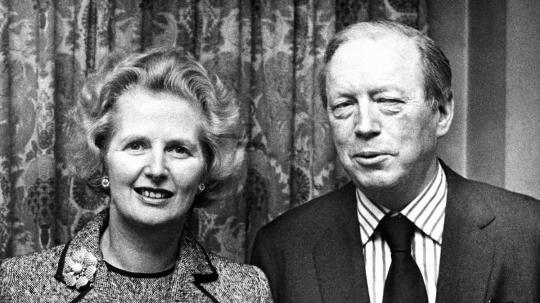

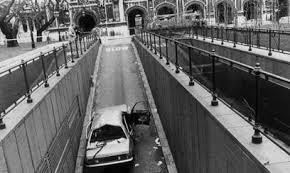
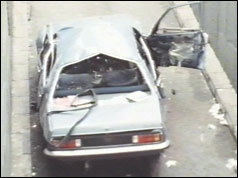
On March 30th, 1979, BBC News reported:
"...Shadow Northern Ireland Secretary Airey Neave has been killed by a car bomb as he left the House of Commons car park. The bomb, said to be highly sophisticated, exploded as Mr Neave began driving up the exit ramp…So far two groups, the Provisional IRA and the Irish National Liberation Army, have claimed they carried out the killing…"
Airey Neave suffered catastrophic injuries and subsequently died at Westminster Hospital. The assassination coincided with the beginning of the general election campaign, and he was set to be Northern Ireland Secretary in the event of a Tory win. He was known as a proponent for using strong military force against Irish republican paramilitaries. The INLA (who it appears were the real culprits), in their justification, described this as 'rabid militarist calls for more repression against the Irish people'.
Margaret Thatcher, Tory Opposition Leader, described Airey Neave as 'one of freedom's warriors. Courageous, staunch, true. He lived for his beliefs and now he has died for them'.
Labour Prime Minister (although not for long), Jim Callaghan, promised that 'No effort will be spared to bring the murderers to justice and to rid the United Kingdom of the scourge of terrorism'.
Airey Neave was a decorated World War Two veteran (MC and DSO) who had achieved the rank of Lieutenant Colonel. He was the first British officer to escape from Colditz Castle.
In April 2019, The Express and other media reported that the investigation into the assassination would be reopened, with focus on a person of interest named Harry Flynn who’d been previously identified as the INLA’s chief of staff. According to the Belfast Telegraph, Britain had attempted to extradite Flynn from France in 1987 where he was serving five years for gun running, but 'failed as his crime was deemed political'.
As of 2019, according to reports, Flynn was aged 65 and ran a pub in Mallorca. There doesn’t appear to be any further reporting on this, so we can assume the case is still open.
#social history#uk politics#british culture#uk government#terrorism#history#uk parliament#modern history#uk history
14 notes
·
View notes
Text
An Army spy operating at the heart of the IRA during the Troubles in Northern Ireland probably cost more lives than he saved, a report has found.
Operation Kenova investigated the agent known as Stakeknife.
It said speculation he had saved hundreds of lives was wrong; it was more likely between high single figures and low double figures.
It found the security forces failed to prevent some murders to try to protect their agents in the IRA.
But, the report pointed out that it was the IRA leadership that had "commissioned and sanctioned" the actions of its so-called internal security unit - of which Stakeknife was a member - and "committed brutal acts of torture and murder".
The £40m investigation took seven years to examine the activities of Stakeknife, who was Belfast man Freddie Scappaticci.
The interim report called for apologies from the UK government and Irish republican leadership on behalf of the IRA.
Lawyer Kevin Winters, who represents the families of 12 victims, said the report was "a damning indictment of the state".
"The staggering takeaway message is that the state could have intervened to save lives," he said.
"We are left with the horrendous conclusion that both state and the IRA were co-conspirators in the murder of its citizens."
The report's author, senior police officer Jon Boutcher, highlighted many failings of the security forces and the UK government, but acknowledged they were acting in an extremely stressful and violent environment.
Multiple murders
Operation Kenova linked Stakeknife to at least 14 murders and 15 abduction incidents.
Despite it being widely known that Scappaticci was Stakeknife, the Kenova Report did not officially confirm that. A further, more detailed report is due to be published by the Kenova team later this year.
However, the interim report said Stakeknife was "undoubtedly a valuable asset" to the security forces who "provided high-quality intelligence about PIRA [Provisional IRA] at considerable risk to himself".
The 208-page report added: "Albeit that his intelligence was not always passed on or acted upon and if more of it had been, he could not have remained in place as long as he did."
Mr Boutcher, who is now chief constable of the Police Service of Northern Ireland (PSNI), said claims Stakeknife saved hundreds of lives were based on "unreliable and speculative" assessments.
Mr Boutcher said murders that could, and should, have been prevented were allowed to take place with the knowledge of the security forces.
'You were not mad'
"Morality and legality of agents doing any harm - with the knowledge of the state - is something that we would never, ever allow today," he said.
Mr Boutcher also referred to the decision not to confirm Stakeknife's identity in his report.
"Stakeknife's identity has been exposed to Kenova, subject to confidentiality which I remain bound by and I cannot make his name public without official authority," he said.
So far the government has refused to give such authority.
But Mr Boutcher added that in his view this position was "no longer tenable" and he expected the "government to authorise Kenova to confirm Stakeknife's identity in the final report".
Referring to Stakeknife's victims, Mr Boutcher said many of them had endured "endless delays, setbacks and unfulfilled promises in their search for the truth".
He said his report confirmed what many families had suspected - patterns of state intervention and non-intervention in the torture and murder of people accused of being state agents during the Troubles.
"You were not mad. This was happening and this should not have happened," Mr Boutcher told them.
11 notes
·
View notes
Text
#OTD in 1948 – Birth of Gerry Adams in Belfast.
Gerry Adams, born in Belfast, former president of Sinn Féin, was one of the chief architects of Sinn Féin’s shift to a policy of seeking a peaceful settlement to sectarian violence in Northern Ireland. He was elected several times to the British House of Commons for Belfast West, however, following party policy, did not take his seat. He represented Belfast West (1998–2010) in the Northern…

View On WordPress
#Belfast#Belfast Agreement#Belfast Brigade#Belfast West#Brendan &039;The Darkie&039; Hughes#British House of Commons#Dolours Price#Gerard &039;Gerry&039; Adams#Good Friday Agreement#Ian Paisley#Irish Republican Army#Martin McGuinness#Provisional Irish Republican Army#Sinn Fein#Stormont#Taoiseach Enda Kenny#The Missing
12 notes
·
View notes
Note
POBLACHT NA hÉIREANN
THE PROVISIONAL GOVERNMENT OF THE IRISH REPUBLIC TO THE PEOPLE OF IRELAND
IRISHMEN AND IRISHWOMEN:
In the name of God and of the dead generations from which she receives her old tradition of nationhood, Ireland, through us, summons her children to her flag and strikes for her freedom.
Having organised and trained her manhood through her secret revolutionary organisation, the Irish Republican Brotherhood, and through her open military organisations, the Irish Volunteers and the Irish Citizen Army, having patiently perfected her discipline, having resolutely waited for the right moment to reveal itself, she now seizes that moment and supported by her exiled children in America and by gallant allies in Europe, but relying in the first on her own strength, she strikes in full confidence of victory.
We declare the right of the people of Ireland to the ownership of Ireland and to the unfettered control of Irish destinies, to be sovereign and indefeasible. The long usurpation of that right by a foreign people and government has not extinguished the right, nor can it ever be extinguished except by the destruction of the Irish people. In every generation the Irish people have asserted their right to national freedom and sovereignty; six times during the past three hundred years they have asserted it in arms. Standing on that fundamental right and again asserting it in arms in the face of the world, we hereby proclaim the Irish Republic as a Sovereign Independent State, and we pledge our lives and the lives of our comrades in arms to the cause of its freedom, of its welfare, and of its exaltation among the nations.
The Irish Republic is entitled to, and hereby claims, the allegiance of every Irishman and Irishwoman. The Republic guarantees religious and civil liberty, equal rights and equal opportunities to all its citizens, and declares its resolve to pursue the happiness and prosperity of the whole nation and of all its parts, cherishing all the children of the nation equally, and oblivious of the differences carefully fostered by an alien Government, which have divided a minority from the majority in the past.
Until our arms have brought the opportune moment for the establishment of a permanent National Government, representative of the whole people of Ireland and elected by the suffrages of all her men and women, the Provisional Government, hereby constituted, will administer the civil and military affairs of the Republic in trust for the people.
We place the cause of the Irish Republic under the protection of the Most High God, Whose blessing we invoke upon our arms, and we pray that no one who serves that cause will dishonour it by cowardice, inhumanity, or rapine. In this supreme hour the Irish nation must, by its valour and discipline, and by the readiness of its children to sacrifice themselves for the common good, prove itself worthy of the august destiny to which it is called.
Signed on behalf of the Provisional Government:
THOMAS J. CLARKE
SEAN Mac DIARMADA
P. H. PEARSE
JAMES CONNOLLY
THOMAS MacDONAGH
EAMONN CEANNT
JOSEPH PLUNKETT
0/10
in English
5 notes
·
View notes
Text

IRA checkpoint during the 70s
#Northern ireland#ira#pira#north of ireland#irish republican army#the troubles#the provisional irish army#ireland#irish history#northern irish history#the ira#ira checkpoint#70s#own post
202 notes
·
View notes
Text
Events 2.28
202 BC – Liu Bang is enthroned as the Emperor of China, beginning four centuries of rule by the Han dynasty.
870 – The Fourth Council of Constantinople closes.
1525 – Aztec king Cuauhtémoc is executed on the order of conquistador Hernán Cortés.
1638 – The Scottish National Covenant is signed in Edinburgh.
1835 – Elias Lönnrot signed and dated the first version of the Kalevala, the so-called foreword to the Old Kalevala.
1844 – A gun explodes on board the steam warship USS Princeton during a pleasure cruise down the Potomac River, killing six, including Secretary of State Abel Upshur. President John Tyler, who was also on board, was not injured from the blast.
1922 – The United Kingdom ends its protectorate over Egypt through a Unilateral Declaration of Independence.
1925 – The Charlevoix-Kamouraska earthquake strikes northeastern North America.
1947 – February 28 Incident: In Taiwan, civil disorder is put down with the death of an estimated 28,000 civilians.
1958 – A school bus in Floyd County, Kentucky hits a wrecker truck and plunges down an embankment into the rain-swollen Levisa Fork river. The driver and 26 children die in one of the worst school bus accidents in U.S. history.
1959 – Discoverer 1, an American spy satellite that is the first object intended to achieve a polar orbit, is launched but fails to achieve orbit.
1966 – A NASA T-38 Talon crashes into the McDonnell Aircraft factory while attempting a poor-visibility landing at Lambert Field, St. Louis, killing astronauts Elliot See and Charles Bassett.
1969 – The 1969 Portugal earthquake hits Portugal, Spain and Morocco.
1974 – The British election ended in a hung parliament after the Jeremy Thorpe-led Liberal Party achieved their biggest vote.
1975 – In London, an underground train fails to stop at Moorgate terminus station and crashes into the end of the tunnel, killing 43 people.
1983 – The final episode of MAS*H airs, with almost 110 million viewers.
1985 – The Provisional Irish Republican Army carries out a mortar attack on the Royal Ulster Constabulary police station at Newry, killing nine officers.
1986 – Olof Palme, 26th Prime Minister of Sweden, is assassinated in Stockholm.
1993 – Bureau of Alcohol, Tobacco and Firearms (ATF) agents raid the Branch Davidian church in Waco, Texas with a warrant to arrest the group's leader David Koresh starting a 51-day standoff.
1997 – An earthquake in northern Iran is responsible for about 1,100 deaths.
1997 – A Turkish military memorandum resulted with collapse of the government in Turkey.
2001 – The 2001 Nisqually earthquake, having a moment magnitude of 6.8, with epicenter in the southern Puget Sound, damages Seattle metropolitan area.
2002 – During the religious violence in Gujarat, 97 people are killed in the Naroda Patiya massacre and 69 in the Gulbarg Society massacre.
2013 – Pope Benedict XVI resigns as the pope of the Catholic Church, becoming the first pope to do so since Pope Gregory XII, in 1415.
2023 – Two trains collide south of the Vale of Tempe in Greece, leading to the deaths of at least 57 people and leaving 58 missing and 85 injured.
4 notes
·
View notes
Text
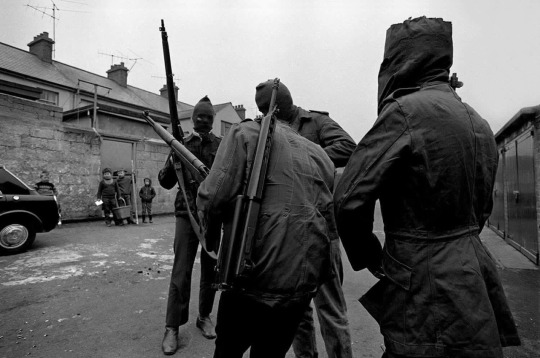
Provisional Irish Republican Army (PIRA)
107 notes
·
View notes